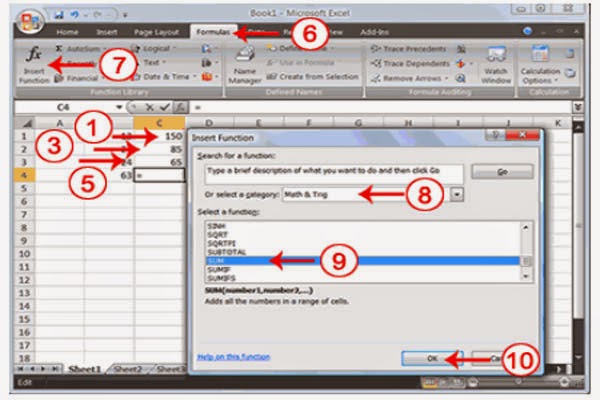In Microsoft Excel, “formulas”
are identified as “function” so meaning all functions will be written in
formulas. Every cell functions will now differ on the type of formula that is
supplied. (Not the basic operations).
Excel function is written in
words with the proper argument/cell command, for adding you can use “SUM”
function.
Reminders:
- When you enter a function make sure to use equal sign before the formula
- Immediately specify the type of function that will use eg. “sum”
- After typing the function name start the argument by enclosing a parentheses within the argument itself. Argument - meaning you are going to specify the cell data that are going to be computed (added).
- Example of Sum Function
=SUM(A2:A4)
As you can see on the function
above, equal sign is always at the first. The name of the function is “SUM”, the
data in the enclosing parenthesis “(A2:A4)” is the argument. (argument can be
separated by comma, meaning by cell data)
To understand more let us try the
example below.
Remember that “SUM” is function
at add values in an argument

- Open New Excel
- In cell B1 type 12
- Hit enter
- In cell B2 type 27
- Hit enter
- In cell B3 type 24
- Hit enter
- Finally in cell B4 type the “=SUM(B1:B3)” OR “=SUM(B1,B2,B3)”
- Upon pressing enter, you will see
63 as a result in adding cell B1 to B3 or B1=12, B2=27 and B3=24.
To understand more let us follow instruction below

- In cell C1 type 150
- Hit enter
- In cell C2 type 85
- Hit enter
- In cell C3 type 65
- Then choose formula tab (refer to the picture above)
- Click IFB or Insert Function button. A small dialog box on insert function will appear
- Select a function category
- In the function box click sum
- After clicking sum, the function argument will appear in a small dialog box.
- You have options to enter an argument by clicking or by typing.

- Click OK and 300 will appear as sum of C1 to C3.
No comments:
Post a Comment